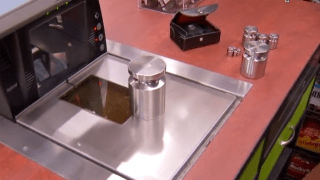
With grocery prices higher the past two years because of inflation and supply chain issues, it’s important to make sure you get what you pay for. That isn’t always the case, however
An NBC 7 Consumer Investigation looked at two years of grocery-store inspection data and discovered dozens of issues at local stores. Some scales were weighing meat and produce as much as half a pound heavier than what a customer was actually receiving.
Grocery stores can have many scales, often at registers or and meat and deli counters. They're tested once a year by inspectors from the county’s weights and measures division. That means you could be paying more for a while before the problem is discovered.
“The impact could be considerable if you add it up over the course of the year,” said Alan Gin, who teaches economics at the University of San Diego. “If they’re not getting as much as they pay for, this just adds to the burden that consumers have.”
Get San Diego local news, weather forecasts, sports and lifestyle stories to your inbox. Sign up for NBC San Diego newsletters.
Between January 2020 and November of 2021, there were 1,056 visits by inspectors checking on grocery scales. Out of those inspections, 146 found at least one scale with violations.
Grocery Stores With Faulty Food Scales
See which San Diego County stores have failed scale accuracy inspections since January 2020.
Source: County of San Diego
Amy O’Kruk/NBC
Not every violation will cost you money. In fact, most of the time, the scales are saving you cash. According to the data we reviewed, only 11 stores had scales that were reading items as heavier than they actually were.
“If it fails in the customers' favor, we don’t red tag it,” said Kevin Porter, an inspector at the county’s weights and measures division. “Stores can still use it but can choose to take it out of service if they want.”
But if the scale is costing consumers more money, it has to be repaired, and stores often have to pay a fine.
Porter inspects one scale at a time, placing weights of slowly increasing amounts on the scale to check its accuracy. Scales are given a .01 pound margin of error up to five pounds, which then increases to a .02 pound margin of error, before finally increasing to the maximum of .03 pound margin of error at 30 pounds.
Inspectors like Porter are given ZIP codes around the county to inspect, and it’s their job to check all the devices in their region. Porter said he inspects about 3,000 devices a year.
“Some stores have 46 computing scales,” Porter said. “You gotta go all over the place.”
Scales also have to be certified and registered with the county. If you think there's an issue with a scale at a store you shop at, you can file a complaint by scanning the QR code on the scale or at the county’s website.
Only two inspections between January 2020 and November 2021 were prompted by complaints, but the county wants people to know there is a group they can call if there are issues.
“Everything gets tested once a year in this county,” Porter said. “We’re out there looking out for the consumer.”
NBC 7 Investigates also looked into how inspectors test the pumps at local gas stations. Click here to watch our investigation and see which stations had issues.



